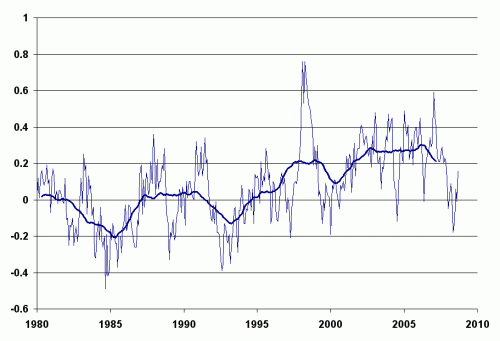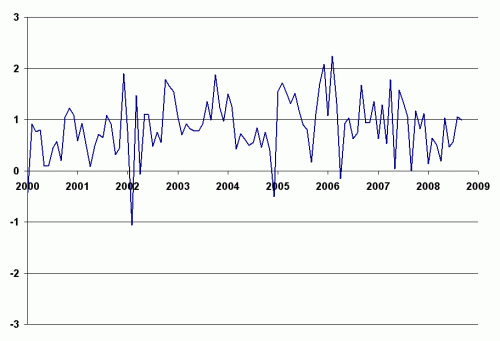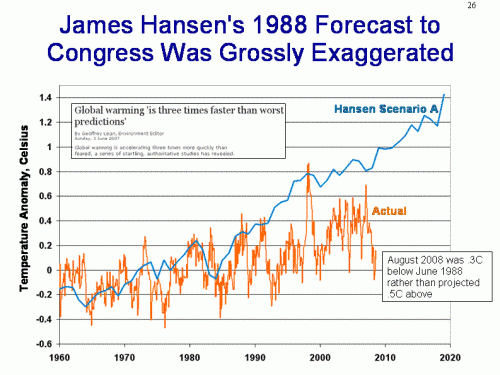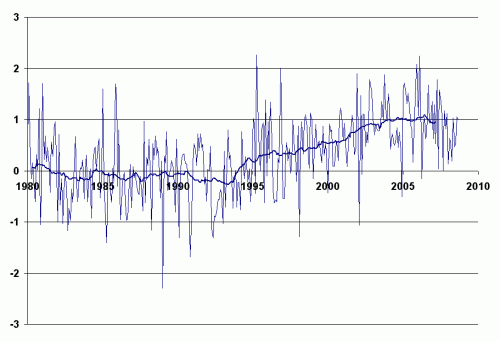A week or two ago a “study” by the World Wildlife Fund got a lot of play in the media. Its key conclusion:
The report says that the 2007 report from the Intergovernmental Panel on Climate Change (IPCC) – a study of global warming by 4,000 scientists from more than 150 countries which alerted the world to the possible consequences of global warming – is now out of date.
WWF’s report, Climate Change: Faster, stronger, sooner, has updated all the scientific data and concluded that global warming is accelerating far beyond the IPCC’s forecasts.
As an example it says the first tipping point may have already been reached in the Arctic where sea ice is disappearing up to 30 years ahead of IPCC predictions and may be gone completely within five years – something that hasn’t occurred for 1m years. This could result in rapid and abrupt climate change rather than the gradual changes forecast by the IPCC.
This is not at all an uncommon meme. If one searches “global warming accelerating” on Google, one gets 1,100,000 hits. The #1 hit says:
I actually believe there is a small upward temperature trend due to CO2, on the order of 0.05 – 0.1C per decade. But it is staggering to me that so many people can insist, with a straight face, that warming is “accelerating” or, crazier, that it is “worse than forecast.”
Let’s take the acceleration first. Here is the recent temperature trend from the UAH satellite data (all the smoothed lines you will see are 36-month moving averages centered on the middle month).
It is possible to argue that there is a warming trend here, but never-the-less it is impossible to see “acceleration,” particularly since 2001. There is an implication in the article that the acceleration has occurred since the last couple of IPCC reports, so let’s zoom into the period since the 3rd and 4th IPCC reports:
No acceleration. Not even any warming (for 8 years! where is that story in the press?)
But how about the proposition that temperatures are rising faster than forecasts? This is patently absurd. We can go back to just about every IPCC and alarmist projection and show that temperatures are well less than forecast, but lets use James Hansen’s forecasts to Congress in 1988 because it gives us 20 years of data to work with (actual data is a blend of Hadley CRUT3 and UAH satellite as discussed here.)
I always get folks who insist that I am making a mistake by using the Hansen A scenario because Hansen at the time described it as extreme. But in fact, world CO2 production has been even greater than the Hansen A scenario. Hansen A underestimates the inputs, and still grossly overestimates the output. The only real discussion one can find on the IPCC forecasts is whether one can argue the actuals are barely poking their nose up into the low end of the forecast confidence intervals or not.
The one piece of evidence most of these folks making the “accelerating” argument use is sea ice extent in the North Pole. The media has been full of stories about disappearing sea ice, and in fact in 2007 the North Pole had the lowest sea ice extent in the last 30 years, though coincidently in the same year the South Pole had the highest sea ice extent in 30 years. But there is a logical fallacy here. The fact that the statement “global warming causes sea ice to retreat” is true does not mean the statement “sea ice retreat means the globe is warming” has to be true. And in fact, we see from the data above, this is not true. It is amazing to me that in the conflict between “thermometers” and “sea ice extent at one pole” as measures for global temperature, sea ice extent seems to trump thermometer readings. Particularly when this sea ice signal only exists at one of the two poles.
There is no question that the Arctic has warmed more than the rest of the planet. In fact, much of the rise in global averages is driven by the Arctic (and all of it is driven by the norther hemisphere above the tropics — the rest of the world has no warming signal over the last 30 years). Below we can see the satellite measurement of the temperature anomaly in the Arctic:
A one degree rise over a couple of decades is indeed substantial. In fact, though, during the last couple of years, we have actually seen either flat temperatures or, perhaps, a cooling trend. Here is a closeup:
So it might be that we should look for other explanations of unusually large sea ice retreats in the summers of 2007 and 2008. It has been suggested by NASA that winds and ocean currents are in part to blame, and by others that black carbon deposits on the ice from Chinese coal plants may also be increasing summer melt.
Whatever the case, there are a lot of good reasons to believe we are not seeing an “acceleration” in global warming. And a lot of very, very good reasons to believe we are not reaching a “tipping point.” Tipping point implies that we have entered a regime where the climate is dominated by runaway positive feedback. I have addressed this topic many times, and will not address it right now, but in short all of the catastrophe in climate models is due not to the assumption of CO2 as a greenhouse gas (which actually tends to yield modest warming in models) but the assumption that the Earth’s climate is dominated by substantial positive feedbacks. I discuss the entire topic of positive feedbacks and climate forecasts in the video below:
Update – if we add glaciers here in addition to sea ice, we see the same slow retreating trend. However, the trend goes back 200 years! That’s 150 years longer than man has been producing substantial CO2 emissions. (source)






the period since the 3rd and 4th IPCC reports…No acceleration. Not even any warming (for 8 years! where is that story in the press?) — you can’t even detect climate change with statistical validity over eight years, let alone an acceleration in the change. None the less, if you were to actually do a linear fit to the date you quote, you’d find a positive trend of +0.05°C/decade.
Hansen A underestimates the inputs – no it doesn’t. See the first figure here.
The one piece of evidence most of these folks making the “accelerating” argument use is sea ice extent in the North Pole – no, there are many lines of evidence.
In fact, much of the rise in global averages is driven by the Arctic – the Arctic covers a rather small part of the Earth’s surface. It cannot ‘drive’ global average temperatures.
(and all of it is driven by the norther hemisphere above the tropics — the rest of the world has no warming signal over the last 30 years) – not true. See here.
during the last couple of years, we have actually seen either flat temperatures or, perhaps, a cooling trend – it is impossible to measure a climate trend over just two years. Any trend you calculate will have huge error bars if you do the statistics. A two year period is utterly useless if you want to talk about climate.
the assumption that the Earth’s climate is dominated by substantial positive feedbacks – perhaps you mean the observation that the Earth’s climate system contains substantial positive feedback mechanisms. That would be more accurate. You’ve just acknowledged polar amplification, after all, which is driven by the ice-albedo feedback.
the trend goes back 200 years! That’s 150 years longer than man has been producing substantial CO2 emissions – we began producing substantial CO2 emissions 250 years ago, not 50 years ago as you seem to believe.
“we began producing substantial CO2 emissions 250 years ago, not 50 years ago as you seem to believe”
Provide proof or shut up. What were the pre-colonial inhabitants doing that represents “substantial” CO2 production. Fishing, farming, heating the tee-pee, milking the cow, brewing beer?
Give me a break, alarmist.
What Jeff intends to demonstrate, I presume, is that thanks to 250 years of anthropogenic CO2 we have been so fortunate to have come out of the Little ice Age and are now enjoying a more benign climate.
I can see where this is going.
Jeff and/or Steve are just leading us all (again) into a giant debate about the meaning of the word “substantial”.
http://www.pewclimate.org/docUploads/images/Historical-Emissions.preview.JPG
cdfman – look at the data, moron.
“jeff” is a troll who used to call himself “scientist”. i wouldn’t waste too much time arguing with him were i you guys…
Well a good way to demonstrate there has been no acceleration in 30 years is to calculate the derivative:
http://www.woodfortrees.org/plot/uah/derivative:1/mean:12/plot/uah/derivative:1/trend
Alex, is that a first derivative of temperature vs. time? I think that would only get you velocity; I think acceleration is the second derivative. Of course, I might not be reading that graph right. Then again, isn’t any non-zero second derivative of position vs. time an acceleration? As in, any change in velocity is an acceleration, whether speeding up or slowing down?
“jeff” is a troll who used to call himself “scientist”. i wouldn’t waste too much time arguing with him were i you guys…
What an odd statement. Ever heard the phrase ad hominem?
I guess “troll” is right up there with “moron” when it comes to ad homs.
Jeff, you bone-headed idiot.
When I asked you to provide some proof/example of man’s 250 year old CO2 production, you provide me with an ice core plot that show lots of 250 year old trapped CO2. You bone-head, that trapped CO2 is not man caused unless you can come up with the processes (coal burning power plants?, inductrial production?, etc? that caused it#.
Sinmply showing that an ice core contains CO2 is NOT proof that man must have been doing something that generated the CO2. Use your head, the CO2 came from some other source #if it is even real#.
I stand: Man’s CO2 production is not 250 years old in ANY SUBSTANTIAL quantities. Electricity production, as well as many other industrial processes that use oil and coal for power are not even half that old – and only really took off at the turn of the century #100 years ago#. The electrical motor #which is tied to virtually ALL industrial processes that generate CO2), was NOT EVEN INVENTED YET YOU DUMBASS.
Get you facts and arguments strait or go fuck yourself, alarmist.
Alex, is that a first derivative of temperature vs. time? I think that would only get you velocity; I think acceleration is the second derivative. Of course, I might not be reading that graph right. Then again, isn’t any non-zero second derivative of position vs. time an acceleration? As in, any change in velocity is an acceleration, whether speeding up or slowing down?
Well, it’s rate of change in temperature, so any trend in the rate of change indicates an acceleration or deceleration of the temperature change; as it is there is a very slight (probably insignificant) downward trend, so global warming APPEARS to be decelerating very slightly.
The mean over the period is 0.001oC per month, which is just over 0.12 oC/decade, but that rate appears to be decreasing very slightly at about 0.011oC/dec/dec.
Obviously it’s very rough, but if there were any significant acceleration in warming, this process would show it, and it simply does not.
OK, cdfman, I can see what kind of language I will have to use for you to understand. Read some history books, you thick fuck. When did the industrial revolution start, you retard? You think you know all about CO2 emissions, and you haven’t quoted a single data source in support of your idiotic beliefs. What a prick. How about at least trying to understand the data before you go out and make an idiot of yourself in public.
Go fuck yourself, idiot.
Jeff,
I appreciate your vigor.
The second set of data you provided in fact confirms my thesis. Thank you for providing data without having looked at it or understood it. Man’s CO2 production is confirmed to be roughly 5% of 2005’s amount at the turn of the century. As you can see from the data (or will when you look at it#, man CO2 production does not really increase until the second decade of the past century #1910 or so#.
Again, Man’s CO2 production does not go back 250 years unless you include campfires, weenie roasts, and burning witches at the stake. The CO2 amounts did not even get to 10% of todays value until the war years starting in 1927. Any contention that man’s CO2 production goes back to before the invention of the electric motor #or more properly its widespread use) is fucking rediculous – as confirmed by your data.
Your agruments suck and you don’t bother to read your data before throwing it out there. Thanks, but I don’t need the assist.
I think given some of the silly links that ‘Jeff’ has posted, he can be dismissed as a religious zealot and can safely be ignored.
I would however like to raise a serious question and possible criticism of your analysis.
Is it reasonable to expect that sea ice melt is responding immediately to recent temperature or is it not unreasonable to assume that there could be a lag period and the effects are cycling through? I thought global climate modelling needed to consider time lags, feedbacks, etc.? If this is plausible, of what relevance would recent temperatures have? I.e., the north pole had significantly more sea ice in 1998 than it did in 2007. In which case what does you argument prove by comparing relatively recent temperatures to sea ice coverage when the effects are claimed to be over long time periods?
cdfman – you can’t spell. Can you add? From the data I quoted, please tell me the cumulative emissions between 1751 and 1910. And then, please tell me where it all went.
Warren Meyer,
I know that this is a repetitive comment, but it probably bears mentioning given your repetitive reference to Hansen’s Scenario A. According to data I have seen, you are correct that that the actual CO2 inputs have been “worse” than Hansen’s assumed inputs for Scenario A. However, other GHGs also play a role as inputs for Scenario A. Therefore, it can be legitimately argued that actual total inputs have been less than Hansen’s assumed inputs for Scenario A. One side note that may be worth mentioning: The Kyoto Accord actually implied incentives for increased emission of a Ozone-depleting chemical, the Green House Gas effect of that chemical has increased. But overall, other GHGs have gone down via the Montreal Protocol. References for what I mention can again be dug up if any one is interested.
On the other hand, Jeff/Steve/Scientist/GW, there is much to take issue on your postings, but for the sake of time, I’m going to only comment on your reference to RealClimate. I will grant you that the casual reader could be impressed with RealClimate, but your reference actual was a key to my becoming disillusioned with the AGW movement. Though RealClimate had been my main source of information on the AGW question, I began to realize how bias, how unscientific, how selective, and how issue-avoidance it really was. Wondering why it handle issues so unprofessionally caused me to expand my reading, and now when a person uses RealClimate as their authority, they are poisoning their own well in my view.
I had no reason to be sceptical of AGW theory as I had no particular interest in the topic. When I did want to find information, I found it strangely evasive and often logically incoherent. I can’t say that I always find the sceptical websites logically coherent either, but when it became obvious to me that perfectly legitimate questions were being danced around and evaded, it was certainly a cause for suspicion. Granting every courtesy I can to AGW proponents, all I can really say is that they have possibly done the worst job in the history of science of successfully communicating the plausibly of their ideas.
An Inquirer – if you want to make accusations of sockpuppetry, then back them with evidence. As for RealClimate, your objections are totally non-specific and therefore meaningless. In any case, I quoted data that happened to be displayed on RealClimate, and not anything that was actually said on that website.
perfectly legitimate questions were being danced around and evaded – such as?
communicating the plausibly – ha ha!
Jeff, the point you missed is that if you point your links to propaganda websites, you’ve labelled yourself as one of the lunatic fringe. You’re no different from the ‘sceptics’ who claim it’s all due to cosmic rays (and probably wear tin foil hats to protect themselves from the radiation to boot). You’re just on the other side of the fence. If you quote credible sources, i.e, say, a National Academy of Sciences review, in preference to, say, a RealClimate or a Mann ‘study’, then you’ve got intelligent sceptical people’s attention and they’ll be inclined to listen to what you’ve got to say. These people are prepared to decide the issue fairly and go either way. You don’t need to preach to the alarmist lunatic fringe as they’re absorbing RealClimate propaganda already. And you’re not going to convince hardcore ‘denyers’ no matter what you write. In fact you tend to have the opposite effect.
Shameless plug to say that I went through the whole WWF report, and I have posted a point-by-point rebuttal in my blog entry “WWF’s Weak Warming Foundations“.
Still, I got sort of “reprimanded” for being too lenient with them 😎
By making wild accusations about ‘propaganda’, in fact, you leave no doubt that you are at the lunatic end of an already lunatic fringe.
intelligent sceptical people…These people are prepared to decide the issue fairly and go either way – these people have already decided the issue fairly. All reasonably intelligent people realised a long time ago that the evidence was overwhelming. Those who remain unconvinced are neither intelligent nor genuinely sceptical. They are just cranks.
“Those who remain unconvinced are neither intelligent nor genuinely sceptical. They are just cranks.”
Yes Jeff that’s an accurate description of yourself.
“the evidence was overwhelming. Those who remain unconvinced are neither intelligent nor genuinely sceptical. They are just cranks.”
So you are basically asserting that anyone on this forum who may have doubts is a crank? Why are you writing trying to convince cranks then? What hope would you have of convincing such people? Because sceptical people are dangerous? Because an unpolluted mind might stumble across this website and be corrupted?
Even the IPCC is only 90% certain. What is your definition of “overwhelmingly certain” ? It sounds like 99.9% or 100%? You have no doubts about any of the ideas in the theory whatsoever? You are even more certain than the scientists?